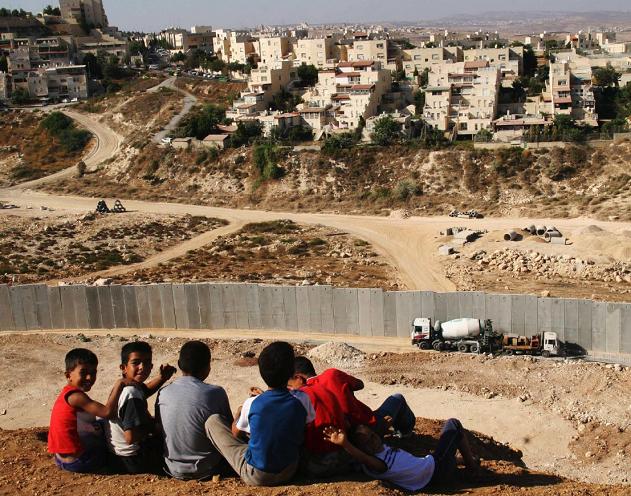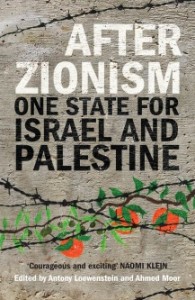Review – After Zionism: One State for Israel and Palestine Books
Books, New in Ceasefire - Posted on Saturday, October 27, 2012 0:00 - 2 Comments
By Hilary Aked

“the unacknowledged truth is that Palestine/Israel is already one country”
The editors of this collection of essays – a Palestinian refugee born in Gaza and now based in the USA and an Australia anti-Zionist Jew – say they collaborated on this book “because of a shared belief that Jews and Palestinians are destined to live and work together, whatever our differences in background, ideals and daily life.”
This idea, that the fates of two peoples so often treated as existing in a state of perpetual enmity might actually be inextricably and very closely linked, is the backdrop to the broad argument asserted by After Zionism: that peace will come not only through justice and recognition of rights but through true equality and coexistence rather than an ideology of separation.
In some ways, the idea the book proposes tries to run before it can walk, outlining how and why contributors feel that a bi-national solution is now the most practical solution, before it has fully explored why it is also the most principled and exposed the ideology that blocks its path. Almost all the writers describe a transformation of the Palestinian struggle which they believe is or should be happening, namely a shift in focus from territory and self-determination to an emphasis on rights, crucially including the right of return for refugees. Only a few flip the puzzle over and reflect on the implications for the ‘other side’ and the state of Israel’s foundational concept, but Saree Makdisi is one, speaking of Israel’s struggle to preserve its “brittle, racist, outmoded ethno-religious colonial state project that is a fish out of water in the twenty-first century” and comparing it unfavourably with the new Palestinians struggle – one for equal rights, regardless of borders.
Makdisi’s contribution stands out for its eloquence and incisiveness, summing up the hopelessness of the two-state solution (reiterated by all the authors in similar fashion) with the killer question “What would a Palestinian state in the West Bank do for the residents of Araqib?” – referring to the village in the Israeli Negev (Naqab) desert where Palestinian Bedouin have had their homes demolished countless times. It is not only the refugees but ’48 Palestinians who remained in Israel – and quite possibly East Jerusalemites too – who would be abandoned by the formation of a Bantustan state in the West Bank and left to endure continued discrimination and vilification.
Sara Roy points out that the occupation “has long been comfortable if not profitable for the Israeli government” and also asserts that peace negotiations have served merely “to preclude establishment of a Palestinian state while the West Bank has steadily dissolved”, a view which seems all the more undeniable in light of Mitt Romney’s recent comments that his Middle East ‘strategy’ would be to “kick the ball down the field” and ignore the issue.
Other recurring themes throughout include echoes of the authors’ introductory sentiment that the Palestinian Authority is “a body designed to manage the occupation for Israel” and repeated exhortations for Palestinian unity to become an actuality. The internationalisation of the struggle and the potential of the still nascent (in the West at least) Boycott Divestment and Sanctions movement are also prominent, Ahmed Moor critically stressing the psychological potency of BDS over its likely economic impact, saying that the boycott call’s primary power lies in the fact that it “makes it harder to ignore apartheid”.
The use of the word apartheid goes to the heart of the argument. Contributors to After Zionism believe that racism is the core problem and that the Israeli preoccupation with demography demonstrates the tension between Zionism – both in theory and practice – and universal rights, international law and democracy. Ahmed Moor’s beautifully written essay states the issue simply, suggesting that “One does not need to know the history of a century-long struggle to understand that something is deeply wrong with the reality today…. it is now enough to know that there are roads in the West Bank only for Israelis”. Yet he also emphasises history and refers to the ethnic cleansing of the Nakba as Israel’s “original sin”, following Ilan Pappe who is at pains to stress that “the crime continues” today and therefore believes a just peace will never come while Nakba denial is still rife in Israel and the world.
Moor writes that “the unacknowledged truth is that Palestine/Israel is already one country”. Practical realities such as Israel’s reliance on Palestinian water and other resources and a quick look at the numbers (one in five Israelis is not Jewish and one in six people in the West Bank is now an Israeli settler) indeed suggests to many that it is much too late for separation and that two states will never come about.
The revelations of the ‘Palestine Papers’ by Wikileaks were seminal, underlining this notion firmly. As Roy sees it, the Palestinians’ illegitimate leadership were shown to have “offered concessions well beyond the national consensus” – yet still these were rejected by Israel. The Palestinian ‘Freedom Riders’ who self-consciously drew a parallel with the civil rights movement in the USA, and used non-violent civil disobedience to oppose segregation perhaps best embody the new Palestinian movement that After Zionism is a part of too.
The book is a plea for a shift in the conversation from one about “how to achieve the unjust two-state solution” to one which focuses on upholding all people’s rights equally. Moor believes that Israel and its shrill demographers will act swiftly to enforce “the Bantustan [two-state] option” before any strong civil rights movement threatens to bring about a one-state solution, the imperative of preserving the Zionist nature of Israel being perhaps the only real incentive for Israel to withdraw from at least some areas of the West Bank. But Pappe alludes to another, even darker possibility, suggesting that another mass expulsion could be enacted to ensure Israel’s Jewish majority in spite of shifting population dynamics.
What might be called ‘the Norman Finkelstein question’ – the apparent impossibility of a one state solution ever being deemed acceptable by the powers that be – is not an easily answered one. Ghada Karmi acknowledges that the obstacles are huge and admits that it is “inescapably the case that both sides identify themselves as national communities with a right to self determination.” The idea of re-imagining and reconstituting the whole of historic Palestine into a secular state with equal rights for all is of course anathema to Zionists and is interpreted – perhaps disingenuously – as ‘delegitimization’ aimed at the ‘destruction’ of Israel but this ideology which is deeply entrenched well beyond Israel’s borders will not be overcome easily. Add to this the fact that most Palestinians do not at present view one state as a favourable or possible solution either, thanks to decades of oppression which have sewn distrust, grievance and ill-will widely and it seems faintly ridiculous.
But this book is nothing if not thought-provoking, in the best sense of the phrase. Without deliberately courting controversy, it is an attempt to mainstream a view that is indeed still quite marginal even though it has gained support in recent years largely due to the abject failure or all else – Karmi asks, “What is the alternative?”.
Makdisi admits that, in theory, a two state solution could fulfil all people’s rights – but rightly says that such a solution has never been the one on the cards, with instead vaguely defined entities up for debate. He then takes self-professed ‘pragmatists’ in the two state camp to task, writing: “Those who claim to be so realistic and pragmatic seem not to have even a passing familiarity with the documented empirical reality of historical experience which teaches us over and over again that no privileged group in the history of the world has ever voluntarily renounced its privileges”. Thus he demolishes the idea that one state is not feasible because ‘Israel will never accept it’, pointing out that Israel would no more accept any two state solution worth having.
 After Zionism is an uncompromising book which boldly relinquishes nationalism in favour of human rights as an organising paradigm. Moor argues sensibly that any solution that doesn’t offer a just resolution to the refugee problem will not be ending the conflict and, as a collection, these essays point the way to a possibly rewarding and perhaps inevitable new direction for the Palestinian struggle.
After Zionism is an uncompromising book which boldly relinquishes nationalism in favour of human rights as an organising paradigm. Moor argues sensibly that any solution that doesn’t offer a just resolution to the refugee problem will not be ending the conflict and, as a collection, these essays point the way to a possibly rewarding and perhaps inevitable new direction for the Palestinian struggle.
After Zionism: One State for Israel and Palestine
Edited by Antony Loewenstein and Ahmed Moor
Imprint: Saqi Books
ISBN: 9780863568169
Published: July 2012
2 Comments
“After Zionism” reviewed in Crossfire — Antony Loewenstein
“After Zionism” reviewed in Ceasefire — Antony Loewenstein
[…] The following review of After Zionism by Hilary Aked appears in Ceasefire magazine: The editors of this collection of essays – a Palestinian refugee born in Gaza and now based in the USA and an Australian anti-Zionist Jew – say they collaborated on this book “because of a shared belief that Jews and Palestinians are destined to live and work together, whatever our differences in background, ideals and daily life.” […]



[…] The following review of After Zionism by Hilary Aked appears in Crossfire magazine: The editors of this collection of essays – a Palestinian refugee born in Gaza and now based in the USA and an Australian anti-Zionist Jew – say they collaborated on this book “because of a shared belief that Jews and Palestinians are destined to live and work together, whatever our differences in background, ideals and daily life.” […]